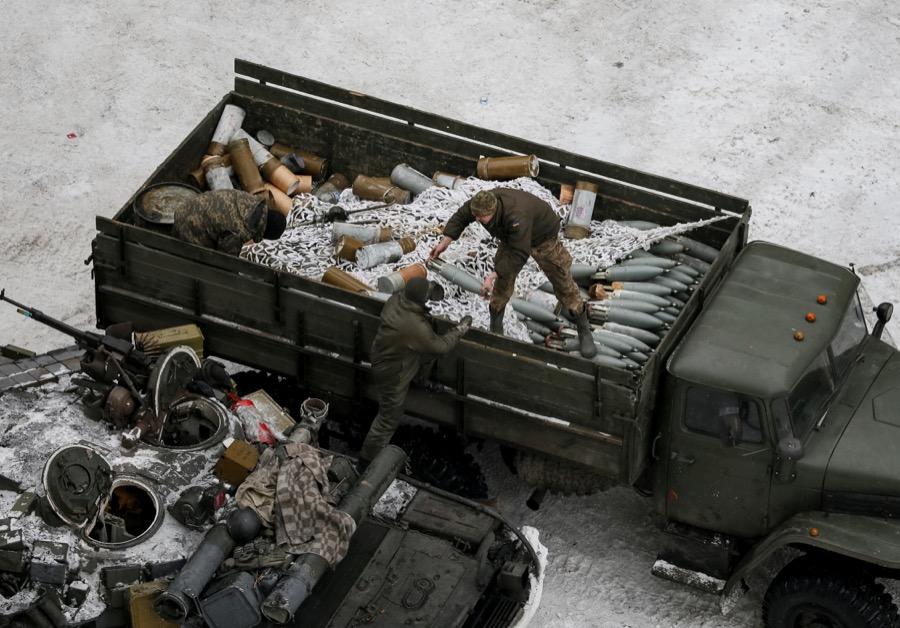How Russia is testing Trump on Ukraine
Crew members prepare tanks in the government-held industrial town of Avdiivka, Ukraine, on Feb. 2.
Ask the Kremlin or any Moscow-backed separatist in eastern Ukraine, and they’ll tell you the government in Kiev is stoking the worst violence there in months.
More than a dozen Ukrainian soldiers and civilians have been killed this past week as vicious shelling has pounded the government-held hotspot of Avdiivka. As is customary in the 2 1/2-year war, both sides have traded blame for starting the fight.
Skeptics, however, will point to last weekend’s phone call between newly minted President Donald Trump and his Russian counterpart, Vladimir Putin, saying the surge in fighting is no coincidence at all.
They think Putin may be exploiting Trump’s apparent disinterest in Ukraine and testing whether he’ll stick to his campaign rhetoric of going easy on Russia. Former President Barack Obama, as well as many other Western leaders, have long blamed Moscow for orchestrating the war in eastern Ukraine.
Putin spokesman Dmitry Peskov said his boss didn’t discuss the latest round of fighting — which has driven local civilians from their homes amid the winter frost — with Trump during their first phone conversation last Saturday.
But then came a curious hint: Peskov added that it was “probably another occasion for the swift resumption of dialogue and cooperation between the United States and Russia.”
Relations between the two countries are at their worst since the Cold War, but Trump’s famously nonconfrontational attitude with Moscow may well change that.
That’s exactly what many Ukrainians fear.
They believe they’ll lose out if Trump patches up ties with Moscow, especially if he lifts Obama’s economic and financial sanctions punishing Russia for its aggression in Ukraine. With a friendlier Washington, Russia might take the cue to further destabilize Ukraine and pull it deeper into the Kremlin’s political orbit.
The World’s host Marco Werman asked BBC reporter David Stern how much Ukrainians fear the US will abandon them: "On a scale of one to 10, 11. They're panicked," Stern said.
Listen here: Thursday’s full episode of PRI’s The World
US Ambassador to the United Nations Nikki Haley said on Thursday that “the dire situation in eastern Ukraine is one that demands clear and strong condemnation of Russian actions.”
“Crimea is a part of Ukraine,” Haley said, defying Russia’s claims over the peninsula. “Our Crimea-related sanctions will remain in place until Russia returns control over the peninsula to Ukraine.”
The Kremlin’s UN envoy Vitaly Churkin dismissed her remarks, saying, “The people of Crimea quite clearly expressed their will [to break from Ukraine and join Russia] in a referendum.”
The White House claimed that Trump and Putin did not discuss the prospect of lifting US sanctions in their call. Top Republicans have warned Trump against considering such a move.
But Trump’s pick of Rex Tillerson for secretary of state raised more suspicions about the administration’s commitment to the penalties on Moscow: Tillerson was the CEO of Exxon Mobil Corp., which lost business with Russia because of the sanctions and lobbied against the policy, according to Politifact.
The day before Tillerson was confirmed, the State Department released a few, carefully worded sentences about the Ukraine violence that failed to even mention Russia, and instead reaffirmed Washington’s support for the so-called Minsk agreements, a peace plan that’s done little to stop the hostilities.
There have been at least 5,600 Ukraine ceasefire violations in recent days, NATO’s secretary general said Wednesday, calling it “the most serious spike in violence” in a long time.
Defense expert Oleskiy Melnyk, an analyst at the Razumkov Center in Kiev, says Putin may well be putting Trump on the spot by ratcheting up the heat in eastern Ukraine.
But he adds that it plays into a much broader problem: Russia’s attempt to play both instigator and mediator in the Ukraine crisis “provides powerful leverage for the Russian Federation in a bigger global game.”
“As long as the Kremlin is keeping this conflict either frozen or active, all these questions — like who started firing first, what’s going to be next — will simply distract” attention from that issue, Melnyk says.
In that greater game, it looks like it’s now Trump’s move.
The story you just read is accessible and free to all because thousands of listeners and readers contribute to our nonprofit newsroom. We go deep to bring you the human-centered international reporting that you know you can trust. To do this work and to do it well, we rely on the support of our listeners. If you appreciated our coverage this year, if there was a story that made you pause or a song that moved you, would you consider making a gift to sustain our work through 2024 and beyond?
